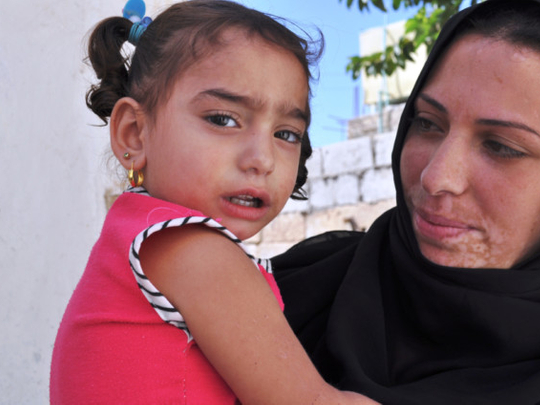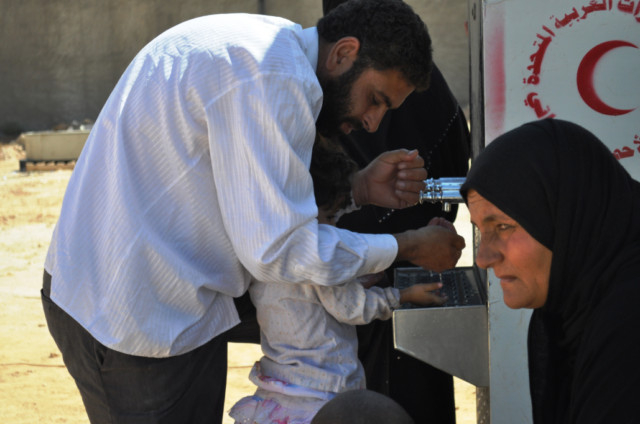
Amman: One night in Daraa while Abdullah and his family were having a picnic in the field metres opposite their house, the earth beneath them suddenly shook. It was because four missiles had been launched and were now inching closer to his family home. Within seconds it was reduced to rubble.
“We are sitting at 5am and all we felt was the ground shaking, then four missiles destroyed the house,” said Abdullah, who is now a refugee in the Zaatari camp in Mafraq, Jordan. “When our home and land got bombed we left Daraa with God’s help through secret alleyways.”
When Gulf News visited the camp on Wednesday, Abdullah, a former blue collar worker, was sitting on the ground outside a tiny portakabin with a group of men, who just like him, had lost everything.
He lives in a tiny space with his entire family — wife and four children. He is a long way from home, which used to be a house on a one-and-a-half acre piece of land destroyed in the airstrike.
“We feel destruction, despair, and psychological trauma, how else should we supposed to feel?” he said frustrated. “Our lives and livelihoods have been destroyed within minutes. [In Syria] they are slaughtering people not from the throat but the back of the neck; children are seeing their parents being murdered, young girls are raped in front of their families.”
Abdullah and the rest of the men we spoke to inside the Zaatari Camp refused to be fully named or photographed for fear of being captured by the Syrian regime.
“I am a wanted man with a price on my head,” he said. “At the beginning of the uprising I would go out and protest with the youths and now they want me dead.”
Living like prisoners
There are around 25,000 Syrian refugees living in the Zaatari Camp, which is one of many camps in Jordan. Although international media reports have repeatedly quoted Jordanian officials talking about the strains the Syrian refugees are placing on the country’s meagre resources, conditions in the camp remain harsh.
“It’s like we are in a maximum security prison,” said Umran. “If my brother wants to come visit me from Syria to give me a hug and a kiss, I’m not allowed. I can only see him through barbed wire and steel gates.”
“If I was in an official prison I would get visiting rights,” he added. “Every prison in the world allows prisoners to have visitors.”
Refugee families spend their days sitting around huddled in the shade because it is too hot to sit inside their tents or portakabins as the scorching sun mercilessly heats up the interior.
“They gave us fans but we have no electricity, we can see the power lines so why don’t they connect the electricity,” said Umran. “There are people here with newborns who are nursing and need hot water, so instead of lighting fires and endangering everyone why not give us electricity?”
Umran has a daughter with special needs and said his family scrambles on top of each other in the dark to make their evening meal.
“We are in a situation where nobody has mercy on us and won’t even let Allah’s mercy reach us.”
The lesser of two evils
However, Yousuf’s mind remains on the situation back home. “We don’t want food or drink, we want weapons to go fight and help the youths back home,” he said. “Because these children you see here, if we take them back to Syria will be slaughtered by the blade of the sharp knife.”
“There came a point at home when people were going to the supermarket to buy a kilo of tomatoes and they’d get shot and falls dead on the spot,” said Umran. “And here [in Zaatari] if my brother sends me a kilo of tomatoes they won’t let me have it.”
Mohammad, another Syrian refugee, summed up the lives now lived by those fleeing and who have fled Syria as one of humiliation and degradation.
“Everybody now knows we have two choices, death in Syria or poverty and degradation here in the refugee camps.”
“This is not how human beings should be treated,” said Abdullah. “There is nothing here in Zaatari to indicate that we are being treated humanly or as people who once needed nothing from no one.”













